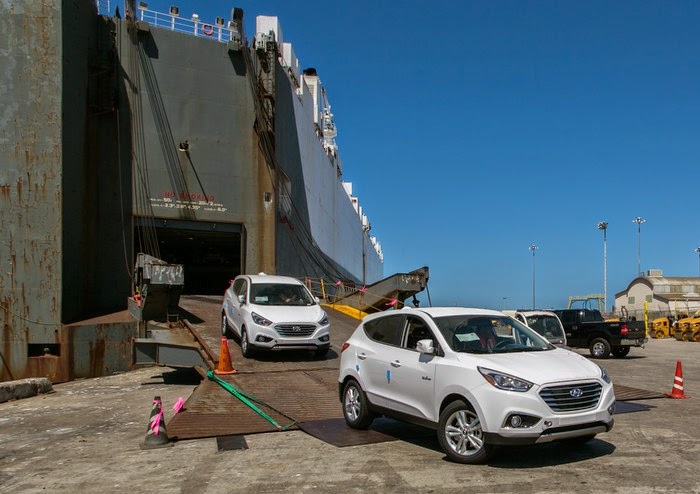A couple weeks ago when Hyundai announced they’d begun shipping the Hyundai Tuscon Fuel Cell Vehicle to California, a couple items in their press release clued me in that this was just a Compliance Car move (see post on examiner.com for writeup![]() ). Now, in a post on Wards Auto
). Now, in a post on Wards Auto![]() , Byung Ki Ahn, Director of the fuel cell group for Hyundai, admitted that Hyundai’s goal is solely to exploit California’s ZEV program. The company, he says, stands to lose money on the Tuscon Fuel Cell Vehicle, but make much more by continuing to sell gasoline burning vehicles in California.
, Byung Ki Ahn, Director of the fuel cell group for Hyundai, admitted that Hyundai’s goal is solely to exploit California’s ZEV program. The company, he says, stands to lose money on the Tuscon Fuel Cell Vehicle, but make much more by continuing to sell gasoline burning vehicles in California.
Before we dive into what he actually said, let’s review the ZEV program a bit.
In the early 90’s California passed a law requiring a certain percentage of cars sold by each automaker to be Zero Emission Vehicles. Under the California Air Resources Board implementation of that law, each automaker earns points (ZEV Credits) on a scale determined by the kind of car. Automakers must earn enough ZEV Credits to continue having the right to sell gasoline burning cars in California.
The highly efficient gasoline engines, and auto-start-stop features? Those earn partial credits, as do straight-up hybrid vehicles like the Ford C-MAX Hybrid or Toyota Prius. Battery electric vehicles earn more credits. But what kind of vehicle earns the most credits? That would be fuel cell vehicles.
A sold or leased fuel cell vehicle earns the automaker many more credits than if they sell or lease a battery electric vehicle. In other words, CARB has tilted the game in favor of fuel cell vehicles.
Returning to Byung Ki Ahn, he told Wards Auto: “We really don’t make any money out of selling the fuel-cell vehicles for now.” So far this sounds like what the Fiat CEO said recently, that Fiat is losing $14,000 per Fiat 500e that’s sold. He, though, went on to tell people to not buy the 500e because it is costing Fiat money. (heavy sigh)
Ahn went on to discuss how Hyundai earns more money from each Tuscon FCEV than they lose on the direct sale. How? The ZEV credits they earn are valuable, because the company can continue selling gasoline cars. “So just by selling the fuel cell (vehicle) we could get a lot of credit
points, which you could sell at a later time if you want, like Tesla does. It could be a good business model.”
What he’s referring to is the revenue Tesla has earned from selling the ZEV credits it earns through Tesla Roadster and now Tesla Model S sales. In 2011, Tesla sold a bunch of credits to Honda earning about $16 million. Why doesn’t Honda have a credible electric car? Maybe they bought enough ZEV credits so they don’t need to make one? Oh, and Honda has its own fuel cell vehicle in customer hands.

![]() The Tuscon FCEV is available for lease only to very selected people in very selected areas. Specifically, Hyundai will only lease the vehicle in areas having hydrogen refueling stations. Currently that’s the Los Angeles basin, only. The cost is $499 a month for 36 months, and $2999 down. The lease includes a significant roadside assistance program, and free refueling at hydrogen stations.
The Tuscon FCEV is available for lease only to very selected people in very selected areas. Specifically, Hyundai will only lease the vehicle in areas having hydrogen refueling stations. Currently that’s the Los Angeles basin, only. The cost is $499 a month for 36 months, and $2999 down. The lease includes a significant roadside assistance program, and free refueling at hydrogen stations.
Hyundai is claiming the Tuscon FCEV is in “mass production” but the production target is a paltry 1,000 vehicles between February 2014 and the end of 2015. So far they’ve build about a hundred.
Extremely limited production – extremely limited distribution area, in a state that earns ZEV credits – that’s the very definition of a Compliance Car. At least Hyundai’s executives are brave enough to be honest enough to admit this in public.
- Highway design could decrease death and injury risk, if “we” chose smarter designs - March 28, 2015
- GM really did trademark “range anxiety”, only later to abandon that mark - March 25, 2015
- US Government releases new regulations on hydraulic fracturing, that some call “toothless” - March 20, 2015
- Tesla Motors magic pill to solve range anxiety doesn’t quite instill range confidence - March 19, 2015
- Update on Galena IL oil train – 21 cars involved, which were the supposedly safer CP1232 design - March 7, 2015
- Another oil bomb train – why are they shipping crude oil by train? – Symptoms of fossil fuel addiction - March 6, 2015
- Chevron relinquishes fracking in Romania, as part of broader pull-out from Eastern European fracking operations - February 22, 2015
- Answer anti- electric car articles with truth and pride – truth outshines all distortions - February 19, 2015
- Apple taking big risk on developing a car? Please, Apple, don’t go there! - February 16, 2015
- Toyota, Nissan, Honda working on Japanese fuel cell infrastructure for Japanese government - February 12, 2015











